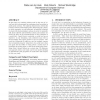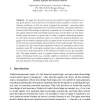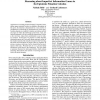66 search results - page 11 / 14 » A Formal Model of Emotion-Based Action Tendency for Intellig... |
ATAL
2007
Springer
14 years 1 months ago
2007
Springer
This paper presents the dynamics of multiple reinforcement learning agents from an Evolutionary Game Theoretic (EGT) perspective. We provide a Replicator Dynamics model for tradit...
ATAL
2005
Springer
14 years 28 days ago
2005
Springer
In this paper we combine existing work in the area of social laws with a framework for reasoning about knowledge in multi-agent systems. The unifying framework in which this is do...
CORR
2011
Springer
12 years 11 months ago
2011
Springer
Imitation can be viewed as a means of enhancing learning in multiagent environments. It augments an agent’s ability to learn useful behaviors by making intelligent use of the kn...
DALT
2005
Springer
14 years 27 days ago
2005
Springer
An agent who bases his actions upon explicit logical formulae has at any given point in time a finite set of formulae he has computed. Closure or consistency conditions on this se...
AAAI
2010
13 years 8 months ago
2010
Approaches to reasoning about knowledge in imperfect information games typically involve an exhaustive description of the game, the dynamics characterized by a tree and the incomp...



